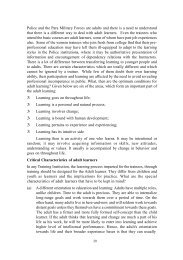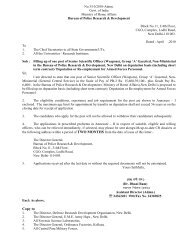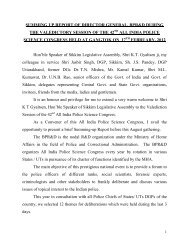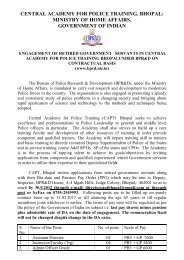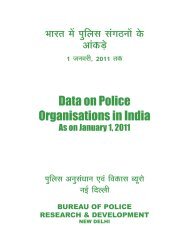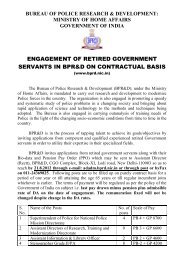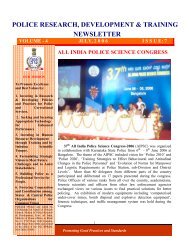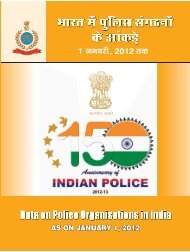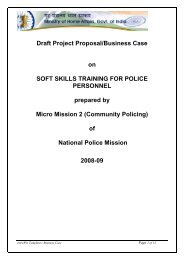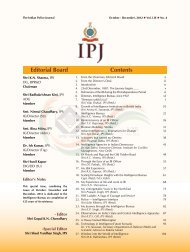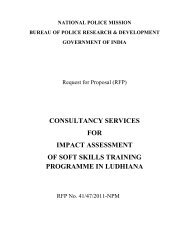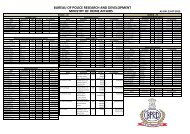April - June 2010 - Bureau of Police Research and Development
April - June 2010 - Bureau of Police Research and Development
April - June 2010 - Bureau of Police Research and Development
- No tags were found...
Create successful ePaper yourself
Turn your PDF publications into a flip-book with our unique Google optimized e-Paper software.
Marital Rape : The Assasination <strong>of</strong> a Woman's Dignitymovement. Differentcountries areincorporatingrespective changes intheir legislations tocriminalize thispractice. But thisconsciousness is yetto be realized in theIndian legal system.No country, no society,no neighborhood, n<strong>of</strong>amily is oblivious <strong>of</strong>this social malice <strong>of</strong>marital rape. But inspite<strong>of</strong> this fact, we still livein a society where it isthought better not todiscuss it <strong>and</strong>broken trust, <strong>and</strong> may feel she cannot trust herselfto decide which people are safe <strong>and</strong> which arenot. Feelings <strong>of</strong> grief <strong>and</strong> loss are common forvictim/survivors <strong>of</strong> marital rape because the rapeis a break in an important relationship. Thesurvivor may still love her assailant, <strong>and</strong> mayfeel terribly torn <strong>and</strong> confused because <strong>of</strong> this.She may experience a great loss <strong>of</strong> self-esteem,<strong>and</strong> feel worthless because someone who "loved"her did something so horrible to her.The loss <strong>of</strong> control over her own life is alwaysan issue for a sexual assault survivor, but whenthat assault takes place within marriage the lossis extreme. When the sexual violence is a part <strong>of</strong>a pattern <strong>of</strong> physical <strong>and</strong> emotional abuse, thevictim/survivor is likely to feel even morepowerless because <strong>of</strong> the controlling behavior <strong>of</strong>her spouse. The survivor cannot go home to findsafety <strong>and</strong> support because the cause <strong>of</strong> thetrauma is in the home; there may seem to be noplace <strong>of</strong> safety anywhere.Lack <strong>of</strong> support from family <strong>and</strong> friends is also<strong>of</strong>ten a problem. Some other difficulties may arisefor a woman if the assailant/husb<strong>and</strong> is also theeconomic provider for the family, or the father <strong>of</strong>her children. For women in this situation, adecision to confront the perpetrator, report thecrime or even try to escape would mean riskingloss <strong>of</strong> income, loss <strong>of</strong> home <strong>and</strong> loss <strong>of</strong> children,not to mention the loss <strong>of</strong> a spouse. For somewomen, the ability to "keep a man" is importantto feelings <strong>of</strong> self worth, <strong>and</strong> they may feel itnecessary to put up with the violence All theseentanglements <strong>and</strong> more, along with the religious<strong>and</strong> social beliefs mentioned above, may functionto keep women in marriages where they areraped. This sense <strong>of</strong> entanglement may cause asurvivor to feel that she is, therefore, responsiblefor the abuse. In addition, survivors who see noway <strong>of</strong> escape may deny or minimize the violencethey live with in order to survive it.In Marital Rape: In New <strong>Research</strong> <strong>and</strong> Directionsit has been said that despite the myth that hashistorically existed that rape by one's partner isa relatively insignificant event causing littletrauma, research indicates that marital rape <strong>of</strong>tenhas severe <strong>and</strong> long-lasting consequences forwomen. The physical effects <strong>of</strong> marital rape mayinclude injuries to the vaginal <strong>and</strong> anal areas,lacerations, soreness, bruising, torn muscles,fatigue, <strong>and</strong> vomiting. Women who have beenbattered <strong>and</strong> raped by their husb<strong>and</strong>s may sufferother physical consequences including brokenbones, black eyes, bloody noses, <strong>and</strong> knifewounds that occur during the sexual violence.Specific gynecological consequences <strong>of</strong> maritalrape include vaginal stretching, anal tearing, pelvicpain, urinary tract infections, miscarriages,stillbirths, bladder infections, infertility, <strong>and</strong> thepotential contraction <strong>of</strong> sexually transmitteddiseases including HIV/AIDS. A study conductedby Maman, Campbell, Sweat, <strong>and</strong> Gielen (2000)found that there is a relationship betweenincreased HIV risk <strong>and</strong> forced sexual intercourse.Most notably this is the result <strong>of</strong> women's inabilityto use barrier contraceptives because <strong>of</strong> theirpartners' threats or refusal to use condoms(Bennice & Resick, 2003; Eby et al., 1995). Theinability to use contraception may also lead tounwanted pregnancy.Some researchers have compared thepsychological effects <strong>of</strong> being raped by one'spartner to other forms <strong>of</strong> violence. Given thatwomen who are raped by their partners are likelyto experience multiple assaults, completed sexualattacks, <strong>and</strong> that they are raped by someonewhom they once presumably loved <strong>and</strong> trusted,it is not surprising that marital rape survivorsseem to suffer severe <strong>and</strong> long-term psychologicalconsequences. Similar to other survivors <strong>of</strong> sexualviolence, some <strong>of</strong> the short-term effects <strong>of</strong> maritalrape include anxiety, shock, intense fear,depression, suicidal ideation, disordered sleeping,<strong>and</strong> post-traumatic stress disorder. Women rapedby their intimate partners are more likely to bediagnosed with depression or anxiety than thosewho are victims <strong>of</strong> physical violence <strong>and</strong> thosewho were sexually assaulted by someone otherthan one's partner. Long-term effects <strong>of</strong>ten includedisordered eating, sleep problems, depression, <strong>and</strong>66 ➢ The Indian <strong>Police</strong> Journal Vol. LVII-No. 2, <strong>April</strong>-<strong>June</strong>, <strong>2010</strong>



